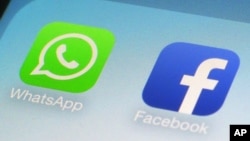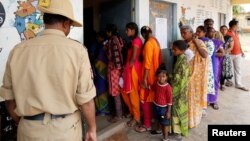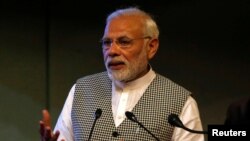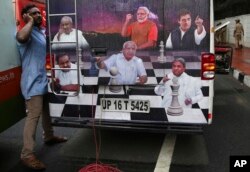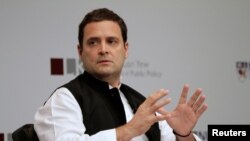WhatsApp faces scrutiny in India amid concerns about the role the app is playing in disseminating information ahead of crucial elections.
Before a recent high-stakes election in the southern state of Karnataka, Rupesh Ramachandran was fed up with the barrage of messages he was receiving on the social messaging service owned by Facebook, which itself has come under fire in the United States in a privacy scandal.
“I was getting bombarded with messages, campaign messages from a Congress Party candidate,” the Bengaluru resident said. He was referring to India’s main opposition party, the Congress Party, which ruled Karnataka and was pitted against Prime Minister Narendra Modi’s party, the Bharatiya Janata Party.
“Every time I blocked his number, I would still receive messages from a different number,” he said. He could identify some as based on false information.
Rashmi Kaushal’s phone also pinged, but with different posts.
“There were lots of anti-Congress ones because the ones from my group were from BJP and a lot of messages which kind of glorified the BJP rule,” he said.
Primary campaign tool
With the explosive growth of smartphones in India, WhatsApp has fast turned into the primary campaigning tool for India’s political parties. But worries are growing that the posts and videos on WhatsApp include misinformation and messages that have the potential to inflame communal tensions.
“There has not been much attention, at least globally, on WhatsApp and its role in spreading fake news,” said Pranesh Prakash at the Center for Internet and Society in Bengaluru. “Indeed, WhatsApp has been far more potent in the spread of fake news than has Facebook [in India].”
Prime Minister Narendra Modi’s campaign strategists successfully used social media in the 2014 general elections. Since then, all political parties have turned to it in a big way. Their focus is mainly on the messaging service used by more than 250 million people in India, including those in dusty towns and villages that high profile campaign rallies will not reach.
It is not surprising. WhatsApp has become a huge favorite in India for chats, calls and messaging: Indian users sent a record 2 billion messages on New Year’s Eve alone.
Researchers estimate that months before Karnataka residents went to the polls, the two main parties created about 50,000 WhatsApp groups to micro target voters. At war rooms set up in the state capital, Bengaluru, battle-ready strategists used laptops to coordinate with hundreds of volunteers throughout the state who were trained at workshops.
But alongside the pro-party messaging and videos that these groups helped spread, there were false news stories, whose sources were difficult to determine because of the encrypted nature of WhatsApp.
Anything was useful: For example, there was a fake post about a BBC poll predicting a BJP win and a letter claiming to be from the U.S. consulate in New Delhi putting a regional party in first place.
“The moment you see a very credible brand being associated with it, you don’t really bother to check whether it is true or not,” said Jency Jacob, managing editor for boomlive.in, a fact-checking website that debunked several such posts and videos including the fake surveys.
The website debunked several other posts as well. Among them, stories that alleged that the Congress Party’s chief minister of the state had been accused of corruption by party president Rahul Gandhi, and, in another instance, a fake email that apparently called on Bangalore’s archbishop to convert Lingayats, a religious sect politically dominant in the state, to Catholicism.
“WhatsApp as a medium is much more dangerous when it comes to how the bad actors are utilizing it,” Jacob said. “Compared to Facebook and Twitter, what happens is there is a huge virality.”
Researchers say what is particularly worrying is the ability to spread misinformation on WhatsApp without being traced.
“It is tougher to research and tougher to investigate and hence tougher to call attention to and tougher to take action upon,” said Prakash at the Center for Internet and Society.
While large numbers of people do not have access to computers or the ability to check facts, there is also worry that many tend to believe what they are reading.
“It is not the illiteracy of the population that is of concern to me; it is rather the suspension of all disbelief when it comes to forwards on WhatsApp,” Jacob said.
The battle on WhatsApp is likely to intensify as India heads into next year’s general election. While Prime Minister Modi remains popular, he is expected to face tough opposition, and both sides are expected to mount an all-out social media campaign to woo voters.
Ankit Lal is a strategist for the Aam Aadmi Party, which rules Delhi and is hoping to expand its presence in other parts of the country. He called the social media app the most powerful tool for politicians. What about the potential for misuse?
“It is like nuclear technology. Whether you use it for a missile or whether you use it to power your home, it’s your decision,” he said.




